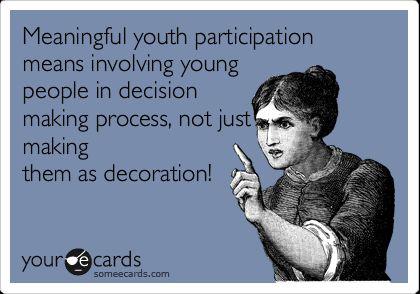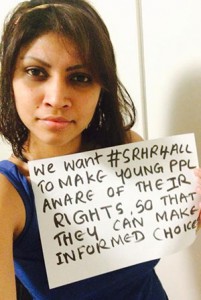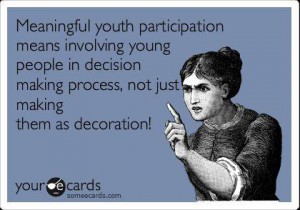
There are many mechanism, agendas and processes such as the post-2015 mechanism in development to ensure gender equality and ‘to leave no one behind.’ These are meant to work together with national strategies, global development discourse, Civil society, UN bodies, grassroots organisations, the corporate sector, etc. Human rights are not a gift and certainly not charity. Governments do not have to ‘give’ us our rights. We are entitled to these human rights from birth. But to realise these human rights and to fully benefit from them, it is very important that young people meaningfully participate and care about development agendas because they impact young people’s lives greatly.
Human rights violations have become rampant and take different forms. They range from violation of rights to education, rights to enjoy your sexuality, the right to access services specially related to sexual and reproductive health, the right to have a safe abortion, the right to love someone of the same sex etc.

Let’s begin with education, which is considered crucial and is one of the biggest investments in international development without doubt. However, the very way in which we define ‘education’ has erected hurdles for the realisation of sexual and reproductive rights. Unfortunately, young people in many countries do not receive comprehensive sexuality or relationship education with proper teacher and parent training and sensitisation. This has profound effects on health both during the adolescent years and also in later life. Lack of youth friendly health services and lack of knowledge of human rights and laws related to protecting rights fuel the gravity of this situation. In many parts of the world, especially in Asia, which has the highest number of young people ever in history, we must realise that young people can contribute to society and the economy meaningfully as active citizens. In spite of an awareness of this huge demographic shift, there is a huge unmet need for information as well as services. It is best if the young people themselves are empowered to become agents of change and make these demands from their governments. They must be supported and recognised, and provided with safe spaces for advocacy and activism which allows them to engage deeply with discourses on rights, development and justice.
In order to reduce human rights violations, overcome these challenges and to change the existing pattern where young people are often offered a seat at the policy-making table merely as tokenism, it is crucial for young people to take leadership in advocating for their own rights and health. For this purpose, young people need sustained capacity building, mentoring and opportunities to represent their cause at relevant forums such as the post-2015 platform. It’s not only the responsibility of young people to be keen to participate in these dialogues and movements but also the responsibility of the international community — the UN, governments, civil societies, corporate sector and activists — to equip and support them. When allowed to participate, young people are expected to represent local and national issues, especially related to taboo subjects like sexuality and sexual and reproductive health and rights, voicing their opinions and needs in order to take issues forward. In order to make space for meaningful participation, there needs to be emphasis on processes that ensure their capacity building, sensitisation on gender and sexuality, training on advocacy, mentoring and partnership building.
Now onward to globalisation and its outcomes. In the Platform of Action resulting from the 1995 Beijing World Conference on Women the application of gender perspectives to all legal and social norms and standards, to all policy development, research, planning, advocacy, development, implementation and monitoring as a mandate for all member states was adopted; this was also called gender mainstreaming. According to these mechanisms gender is supposed to be taken into account in all the policies, instead of formulating specific policies on gender, making matters related to gender central in the development agenda in all sectors: economic, social and political. However such gender mainstreaming, or even the MDGs and ICPD 2015 platforms have still failed to address gender inequality in a nuanced manner. One huge reason for this is that the gender focus tends to look at not at gender relations or prevailing assumptions about sexuality, masculinity and femininity, but specifically at women, and women as different from men. This marginalises people across the gender spectrum, particularly transgender folks, their statuses and relations with each other. Young people must recognise such disparities and advocate for such change themselves, in order to be able to make ‘development for all’ a lived reality.

But young people were left out of the process that led to the formulation of development goals and platforms and mostly in the implementation until recent times. This is why young people have to take charge and ensure that these agreements, targets and commitments go from words on a piece of paper to policy to reality. Of course the UN jargon and development-speak seems scary and terrifying. But this should not worry us, because once we learn them and get the hang of it, they are pretty simple. I learnt this from my own experience as a young person when I first attended the Beijing +20 meeting in 2014 where we were taught all this jargon and were prepared to attend the meeting by a civil society organisation (IWHC). That helped all us young people a lot and we could meaningfully participate in negotiations and in the process. What I learnt on top of this is that as young people, we also must make sure to come up with a mechanism to monitor our nations and hold them accountable to us. Once again I would like to emphasise the importance of young people in post 2015 platforms where they get to lobby for these goals and indicators.
“Nothing for us without us.” That must be our demand.